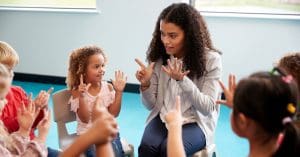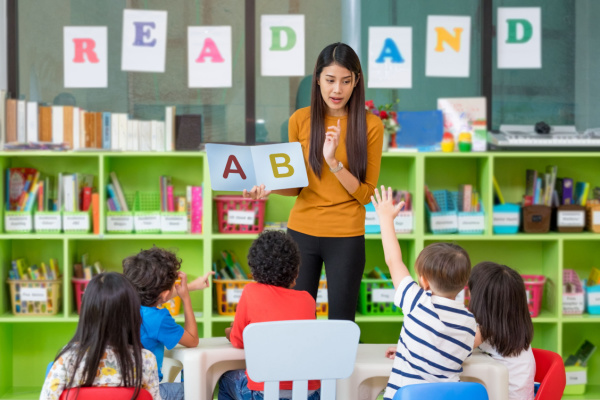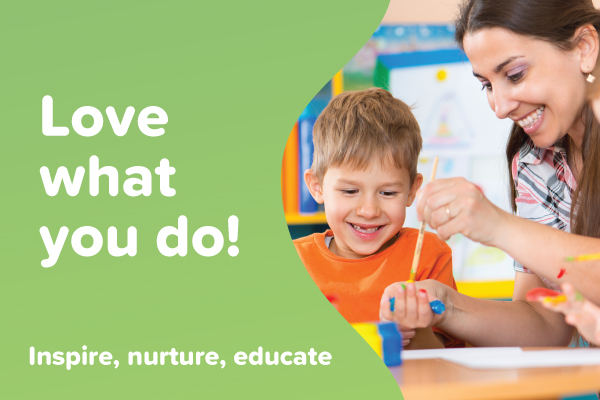When exploring career options, it’s common to consider what skills are required to do well. For just about any job in any sector, you will be better off if you have well-developed adaptive skills. These are interpersonal skills and transferable skills — and they are particularly valuable in early childhood education.
Change is constant in all aspects of life, from nature to technology, work to relationships and everything in between. Workplaces continually grow and shift over time and being able to adjust to these changes means you are better equipped to thrive at every stage of your career.

Adaptive skills — what are they?
When considering just how important is it to be adaptable and develop adaptive skills, and what those skills are, it’s worth reminding ourselves of what adaptability means:
Adaptability is defined as the ability and/or willingness to change to suit or adjust to varying conditions.
With this in mind, adaptive skills are the skills that allow us to adapt and handle changes in a positive way. In the past, these skills were sometimes known as soft skills or interpersonal skills. They are core skills for any workplace and play a key role in life outside of work too.
Learning valuable adaptive skills for early childhood
The CHC30121 Certificate III in Early Childhood Education and Care and the Diploma of Early Childhood Education and Care have recently been updated. In the updates, we have strengthened our focus on these adaptive skills for educators. Developed in consultation with the sector and subject matter experts, learners are guided through applying adaptive skills in their role as educators with care and compassion.
Some of the most important adaptive skills to focus on developing — especially when exploring a career in early childhood education — include:
Teamwork
Early childhood education frequently involves working as a team. To be a productive member you will need teamwork skills. These include communicating, taking responsibility and having awareness of the dynamics of a team and how you can best play your role to achieve the desired outcomes.
Emotional intelligence
Understanding your own emotions and those of others means you can more effectively respond to and manage emotions in yourself and others. Educators are frequently looked up to as role models to young children who are learning how to explore and manage their own emotions, so emotional intelligence is a highly valuable skill for those working in early childhood education.
Problem-solving skills
Coming up with viable ways to solve a problem is a highly useful skill in the workplace. When solving problems you must know how to call on the ability to research, analyse and make decisions.
Critical reflection
Becoming skilled at critical reflection is to take what has come to pass, recognise what you have learned and understand how this can inform what happens in the future. It helps you to make meaning from what is taking place and learn from it to shape a bright future.
Communication skills
Strong skills in speaking, writing, listening and reading are crucial to build meaningful relationships in early childhood education. This includes speaking at the right volume and being clear, friendly, confident and respectful. Communication also extends to the effective use of non-verbal cues such as body language.
These adaptive skills in action could be knowing how to ask questions to help others feel safe and connected, how to actively listen and seek proactive feedback, and to support others to do the same. When you work on developing these skills, you are well on your way to being able to navigate evolving situations with care and precision to make smart choices and adapt to the environment within which you are working.
Why adaptive skills are vital in early childhood education
Being adaptable can also help you advance your early childhood education career. The continually evolving pandemic situation is a good example of when adaptability is needed. Over the last few years early childhood education has faced a host of changes to best practices across the sector. From new drop-off and pick-up protocols to mask-wearing and managing prevention and control of a new virus. Those educators with well-developed adaptive skills have been able to pivot to the needs of the sector and support children and families in navigating change too. The result: less stress and a sense of disruption for the individual, not to mention those in their care or in their team.
Adaptive skills or interpersonal skills are human qualities — perfect for working with humans! When a person has well-developed adaptive skills, they are more likely to be able to thrive in early learning and contribute positively to children’s lives, early childhood education services and the early childhood education sector.
Improve your adaptability skills
While a number of adaptive skills may come naturally to some, they can also be learned and developed with training, reflection and practice. Next time you’re assessing the skills you have to be a valuable educator in early childhood education settings, don’t discount the significance of adaptive skills.
Whether you feel that you have strong adaptability already or you’re working on developing your adaptive skills, there is always room to grow. Here are a few tips to help you develop and improve your adaptability skills now and well into the future:
- Develop a growth mindset: This means trying new things, taking on new challenges and looking for opportunities to gain more knowledge and contribute in new areas.
- Gain an understanding of your environment and any changes: Make knowing your working environment a priority, and stay on top of changes as they come. Read the updates in the sector and be prepared for what’s coming in the future.
- Set personal and professional goals: If there is a particular adaptive skill you want to work on, make note of it and strive to improve. Goal setting is imperative to improvement that you can see and feel proud of.
- Acknowledge changes and accept them: It can sometimes feel like a knee-jerk reaction to resist change. In some instances, the change might be something you disagree with and can take action to address. Often however change is unavoidable or necessary and the quicker you can acknowledge and accept it, the better off you will be.
Our early childhood education courses focus on adaptive skills to ensure our learners become more flexible, self-aware, solution-focused, and resilient educators. In turn, they are gaining the skills required to become sector leaders who deliver the best start in life for children.
To learn more about our early childhood education courses, get in touch.


